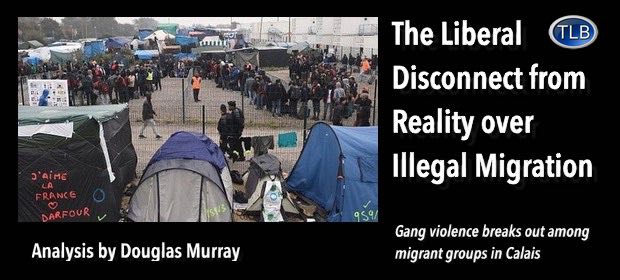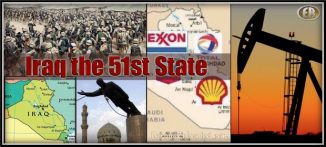
Pam Barker | Director of TLB Europe Reloaded Project
It’s rather timely to be publishing Douglas Murray’s piece on the automatic yet rather puzzling prejudice many display when it comes to the topic of illegal migration within Europe – the assumption of  ‘goodness’. Let the great and good of Hollywood lecture us on how to view illegal migrants, as Murray describes below.
‘goodness’. Let the great and good of Hollywood lecture us on how to view illegal migrants, as Murray describes below.
So yesterday afternoon saw a display of typical warts-and-all humanity when gang-related violence involving guns and other weapons erupted twice between groups of Afghan and Eritrean illegals in and around Calais. We recommend the RT piece, Several shot & dozens injured as 100+ migrants face off in bloody clashes in Calais. French interior minister Gerard Collomb (pictured) commented, “This is a degree of violence previously unknown.” Not surprisingly, Calais mayor Natacha Bouchart wants none of it, demanding the state step in and expel these people. So much for natural goodness.
**********
The ‘Goodness’ of Migrants: When Feelings Trump Facts
DOUGLAS MURRAY
- No one asked what in the hearts of the migrants of Calais is so very “good”, and what “goodness” is so lacking in the hearts of the British people that it needs topping-up from the camps of Calais.
- It is worth reflecting on just two recent terrorist plots, by people who did not bring only “goodness” when they came from Calais.
- The question fails to get asked: “What exactly did we gain from their presence in our country? And what exactly was the ‘goodness’ that you think they brought?”
In Western Europe, there is still only an overwhelming political and social price to pay for appearing to be against mass immigration. Public opinion polls may consistently show the public to be opposed to mass migration. But in public, it remains most acceptable, and indeed commonplace, to continue to utter bromides about the benefits that migration brings, including the advantages from any and all illegal immigration.
Recently on the BBC’s main political discussion programme, Question Time, the panel were asked about immigration and, as so often in the British immigration debate, the subject of the situation in Calais, France came up. Over recent years Calais has repeatedly become the place for illegal camps of illegal migrants to congregate, in the hope of moving from France to the UK. Some of these migrants attack lorries and disable vehicles to try to climb aboard them. Others attempt other ways to get through the Channel Tunnel, either on a vehicle or on foot.
 A group of migrants gather near a truck depot in Calais, France, on January 19, 2018. Calais is a central hub for illegal migrants to congregate, in the hope of moving from France to the UK. Some of the migrants attack UK-bound lorries and disable vehicles, to try to climb aboard them. (Photo by Leon Neal/Getty Images) A group of migrants gather near a truck depot in Calais, France, on January 19, 2018. Calais is a central hub for illegal migrants to congregate, in the hope of moving from France to the UK. Some of the migrants attack UK-bound lorries and disable vehicles, to try to climb aboard them. (Photo by Leon Neal/Getty Images) |
Of course, if these people were genuine asylum seekers with genuine asylum claims, they have already passed through several countries in which they could and should have claimed asylum. That they are congregating around the entrance to the Channel Tunnel in Calais is a demonstration not that they are legitimate asylum seekers in search of safety, but illegal migrants seeking to get into Britain.
Like everything else in the immigration debate, and often life, feelings most of the time trump facts. The discussion on the BBC’s Question Time was, in that sense, utterly typical. One of the guests on the panel was the Hollywood scriptwriter Dustin Lance Black. A social and political liberal, Black used his time there to make one extraordinary claim in particular:
“Understand that some of these people who are in Calais trying to get here. They’re not coming to try and steal from you or to ruin your culture. They’re coming here because you’re a giant, beautiful beacon of hope for them. And I hope that the government finds it in their heart to spend some of that money to make sure that their conditions are liveable there and to let some of them in, to share their goodness with your greatness.”
This speech was greeted with a roar of applause from the audience and audible approval from other members of the panel including the Conservative cabinet minister, Margot James. No one asked what there is in the hearts of the migrants of Calais that is so very “good”, and what “goodness” is so lacking in the hearts of the British people that it needs topping-up from the camps of Calais.
So even in a society as self-delusional and self-forgetting as modern Britain, it is worth reflecting on just two recent cases of people who did not bring only “goodness” when they came from Calais.
At the beginning of January, Munir Mohammed of Derby was convicted of an attempted terrorist attack. It is believed that Mohammed and two collaborators were planning a Christmas terrorism spectacular involving a bomb attack. Mohammed was apparently only days away from achieving his aims when he was arrested by the British police…
CONTINUE READING HERE
ER recommends other articles by The Gatestone Institute
About the author
Douglas Murray, British author, commentator and public affairs analyst, is based in London, England. His latest book, an international best-seller, is “The Strange Death of Europe: Immigration, Identity, Islam.” Follow Douglas Murray on Twitter
Image of Gerard Collomb from RT: French Interior Minister Gerard Collomb (C) meets with gendarmes on February 2, 2018 in Calais, northern France, following a large brawl between a hundred migrants which resulted in several injuries © PHILIPPE HUGUEN / AFP
Featured image: AFP PHOTO / FRANCOIS LO PRESTI




